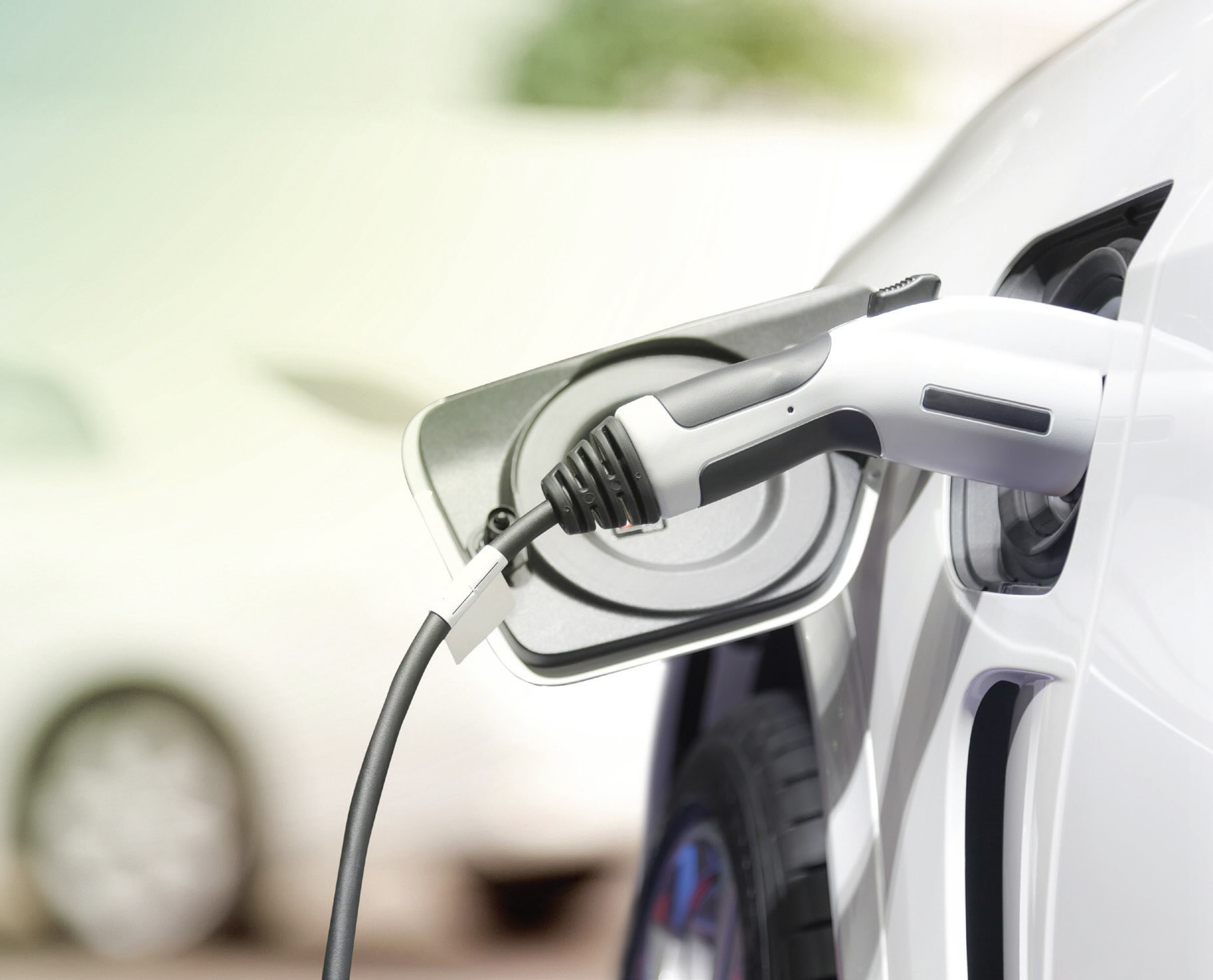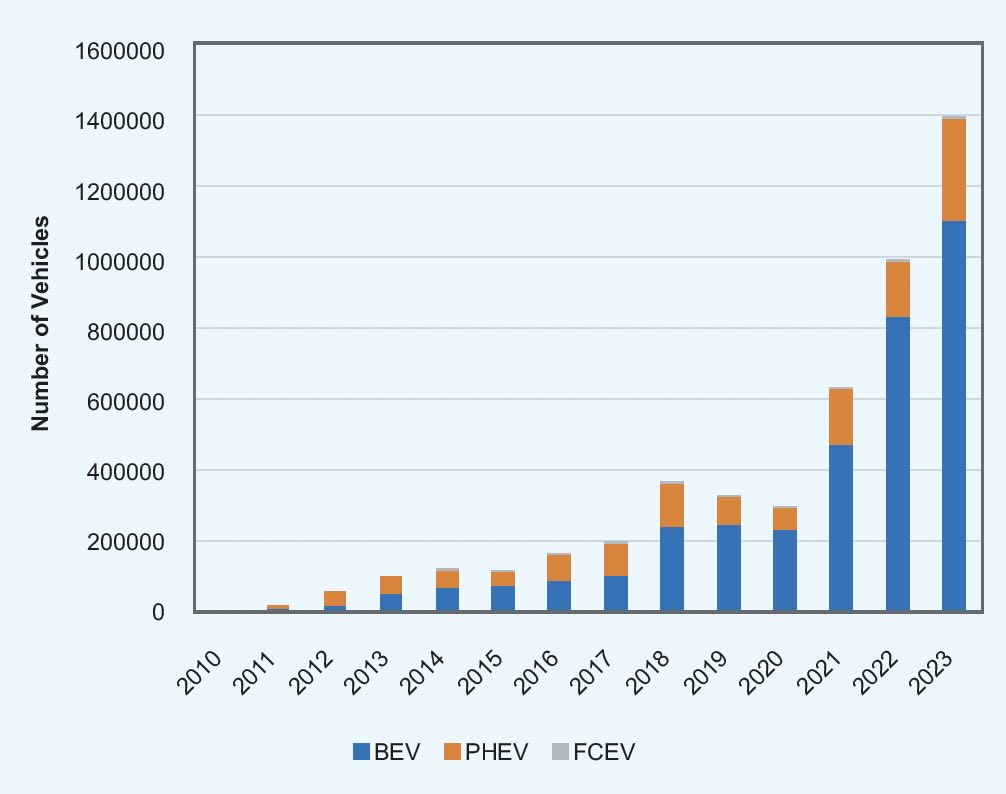Electric vehicle adoption in U.S.
By Dr. Arup Gangopadhyay, Contributing Editor | TLT Automotive Tribology
Growth in electric vehicle sales has been impressive but still lower than expected.

I have given a few presentations in the early 2020s at STLE conferences on various forms of electric vehicle (EV) and associated technologies. I also shared projections on the growth of EVs estimated by different companies at that time. One of the companies estimated that in North America the EV sales (combination of battery electric vehicles [BEVs], hybrid electric vehicles [HEVs] and plug-in hybrid electric vehicles [PHEVs]) will enjoy 38% of the total vehicle sale by 2025.
Automotive companies around the world including North American companies were allocating billions of dollars for engineering, research (mostly on battery technology) and development and redrawing manufacturing footprints. Figure 1 shows the impressive growth of new EV sales in recent years, but it is still far less than the projected growth, less than 10% of the total vehicles sold in 2024. But I am not surprised by this considering how cautiously automotive companies and also buyers are taking steps forward.
 Figure 1. Growth of new electric vehicle sales from 2010 through 2023.
What are the reasons behind it? Obviously the financial incentives do not look lucrative enough. The adoption of EVs by customers in the U.S. can only accelerate if owning such a vehicle proves beneficial from both financial and convenience standpoints. The main roadblocks for EV adoption are high initial purchase price, range anxiety and inadequate public (safe) charging infrastructure.
The countries with the highest adoption of EVs in the world in 2024 were Norway (89%), Denmark (50%), Sweden (34%) and Netherlands (33%). We can explore how these countries made the transition and learn a few things from them. Norway made 2025 as the first year to achieve 100% new vehicle sales to be electric. This is remarkable considering their huge natural reserve of petroleum. However, this did not happen suddenly. They had a 25-year roadmap to achieve this and stuck to the plan along the way. It started with giving incentives to new buyers as indicated below although some of the tax benefits were reduced over time.
Figure 1. Growth of new electric vehicle sales from 2010 through 2023.
What are the reasons behind it? Obviously the financial incentives do not look lucrative enough. The adoption of EVs by customers in the U.S. can only accelerate if owning such a vehicle proves beneficial from both financial and convenience standpoints. The main roadblocks for EV adoption are high initial purchase price, range anxiety and inadequate public (safe) charging infrastructure.
The countries with the highest adoption of EVs in the world in 2024 were Norway (89%), Denmark (50%), Sweden (34%) and Netherlands (33%). We can explore how these countries made the transition and learn a few things from them. Norway made 2025 as the first year to achieve 100% new vehicle sales to be electric. This is remarkable considering their huge natural reserve of petroleum. However, this did not happen suddenly. They had a 25-year roadmap to achieve this and stuck to the plan along the way. It started with giving incentives to new buyers as indicated below although some of the tax benefits were reduced over time.
- No purchase/import tax on EVs, exemption from 25% VAT, no annual road tax, no charges on toll roads and ferries
- Free municipal parking
- Access to bus lanes. New rules allow local authorities to limit the access to only include EVs that carry one or more passengers
- 25% reduced company car tax
- Exemption from 25% VAT on leasing
Denmark also offers similar incentives like tax exemption, lower interest rates on financing EVs, reduced vehicle registration fees, government grant for home installation of fast charging station, expanding charging infrastructure, access to bus lanes, etc.
Currently in the U.S., the financial benefit is limited to $7,500 and it is applicable to those having modified adjusted annual income less than $300,000. Some state governments also offer some financial benefit for installing a home charging unit. Although financial benefit is a good reason for buying EVs, I think more benefits in the form of convenience as mentioned here can provide more inspiration:
- No/reduced vehicle registration fee
- No/reduced tax on vehicle purchase price
- Colored license plate for easy identification of EVs
- Reserved parking for EVs like handicap parking in front of grocery stores, shopping malls, etc.
- No parking fees and reserved parking on parking garages with charging facility
- No entrance fee for metro, state and national parks
- More charging stations and ensure safety in surrounding area
But most importantly there must be a long-term vision, a political will and alignment between political parties.
REFERENCES
1. IEA (2024), “Global EV Data Explorer,” International Energy Agency, https://www.iea.org/data-and-statistics/data-tools/global-ev-data-explorer.
2. Gridserve (2024), “Why Norway Leads the World in EV Adoption,” Gridserve.com, https://www.gridserve.com/why-norway-leads-the-world-in-ev-adoption.
3. Norwegian EV Association (2024), “Norwegian EV Policy,” elbil.no, https://elbil.no/english/norwegian-ev-policy/.
Dr. Arup Gangopadhyay is retired from Ford Motor Co. and is based in Novi, Mich. You can reach him at arup.gangopadhyay@sbcglobal.net.